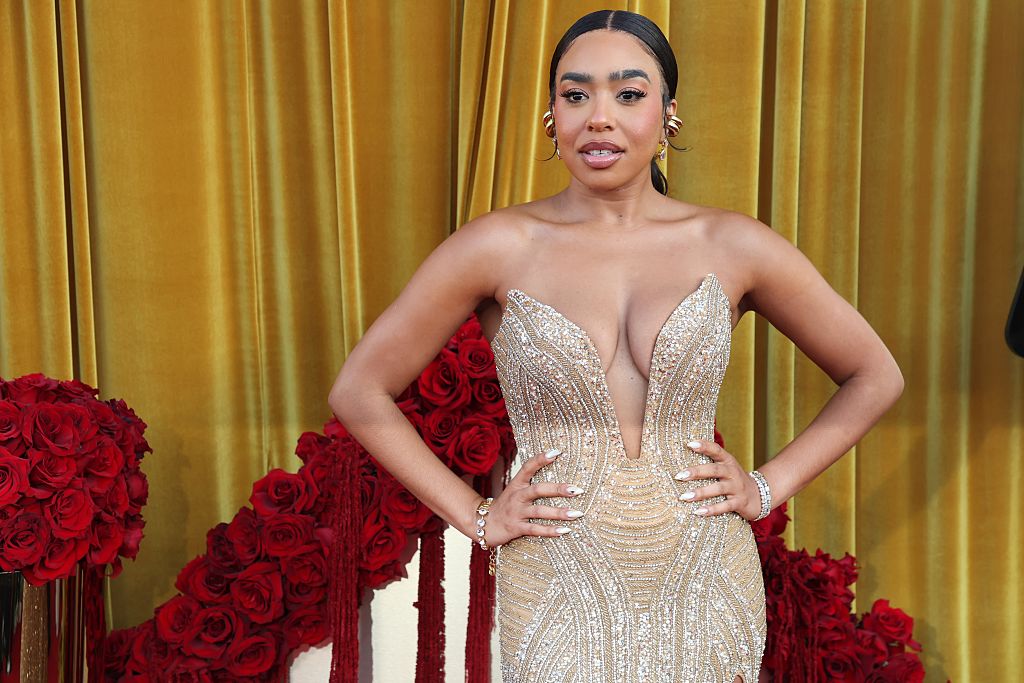This week, a conversation between B. Simone and her best friend, Shekinah Yon, turned into a masterclass in messy, complicated, and very real friendship dynamics. Of course, the internet had a lot to say about it. Clips from their podcast, “Let’s Try This Again,” started making the rounds online, and within hours, timelines were questioning what they really expect from their friends.
In the episode, B. Simone and Yon got raw about the challenges they’ve faced both individually and together. But it was two particular moments that got people talking.
The Moments People Are Discussing
One clip showed Yon expressing heartbreak over navigating an extremely difficult year, which included unemployment, financial instability, and life as a single mom. While going through it, she was watching her best friend seemingly thrive. She explained how painful it was to see B. Simone give financial help to others while she was silently struggling.
“This was the hardest season of my life,” Yon said, adding that she lived with her parents and had her car repossessed. “Everybody thinks that, oh, because you’re connected to this person then your life is just as grand as theirs, or they are helping you. I saw you do this for other people.”
Another viral moment came from B. Simone herself, who confessed that she felt “angry and sad” when Yon landed an opportunity that B. Simone didn’t directly facilitate. Her vulnerability revealed a level of possessiveness people don’t often admit in friendships.
“It hurt me that I couldn’t take credit for it,” she said plainly.
The backlash was swift, but the reactions weren’t all one-sided. Some people called B. Simone selfish or questioned the authenticity of their friendship. Others, though, applauded both women for laying bare what so many are too afraid to admit. Friendship, especially in adulthood, is complicated and evolving.
When One Friend Has More
For many, Yon’s story hit a nerve. It’s hard to watch someone else soar when you’re scraping to survive. It’s even harder when that person is close to you and you know they have the resources to help.
In Black communities, many are taught to be strong, to push through, to “figure it out.” Asking for help can feel like weakness. On the flip side, having help to give but deciding not to offer it can stir guilt or be judged as cold-hearted.
Where’s the line? Should friends always step in when they have more? Is emotional support enough when one friend is drowning in real-life hardship?
The “Selfish Season” Dilemma
B. Simone described being in a “selfish season,” which she explains as a phase where she focused inward and stopped giving so much of herself to others. That language alone sparked debate. Is it okay to go inward if it means you’re not showing up for the people who love you most?
Boundaries matter. But so does honesty about where those boundaries begin and end. Sometimes people don’t realize the collateral damage of their growth until someone they love calls it out.
Friendship Isn’t Transactional, But It Is Relational
Another gem from the episode was Yon saying she didn’t expect a handout, but that didn’t mean it didn’t hurt to be overlooked.
This is where many people missed the nuance. Helping a friend doesn’t have to come from obligation, it can come from love. Additionally, not helping doesn’t automatically make someone a bad friend. But ignoring how your choices impact the people closest to you can form cracks in the foundation you’ve built.
“Nobody’s looking for the perfect friend. I just want my friends to be aware and honest,” Yon said.
So What Makes a “Good” Friend?
That answer is far from black and white. But there are key questions you can reflect on when tensions start to rise in your friendships. Questions that demand honesty, grace, and self-awareness.
One of the first things to consider is whether you’re showing up in a way that honors your friend’s needs, not just what you feel capable of giving in the moment. Sometimes people tell themselves they’re being “present,” but they’re really offering the bare minimum. Showing up means noticing what your friends are carrying, not just waiting for them to tell you they’re overwhelmed.
It also means checking in with your own limitations. Have you been honest about what you can or can’t provide emotionally, financially, or energetically? Being a good friend doesn’t mean doing everything. It means being transparent about what’s possible and communicating that clearly.
Another thing to reflect on is whether you can truly celebrate our friends’ wins, even when you didn’t play a part in them. That may sound small, but resentment and ego can creep in when we start feeling left behind. Love means being proud without needing to be the reason.
Finally, when your friends are hurting, are you truly listening? Or are you centering your discomfort, guilt, or your perspective? Holding space for someone else’s pain without defensiveness is one of the hardest but most powerful things a friend can do.
What made this podcast episode so viral wasn’t that B. Simone and Shekinah did everything right. It’s that they showed everyone that friendship isn’t about perfection. It’s about choosing each other again, even when it’s hard. The conversation they sparked isn’t just about who’s wrong or right, but it’s about how friends love each other through seasons of imbalance, silence, and even resentment.
